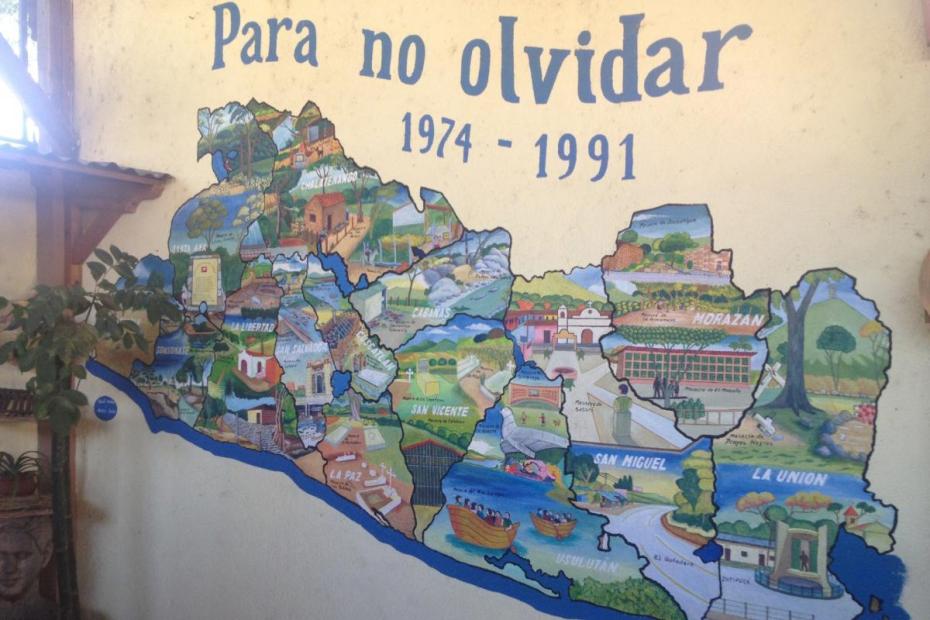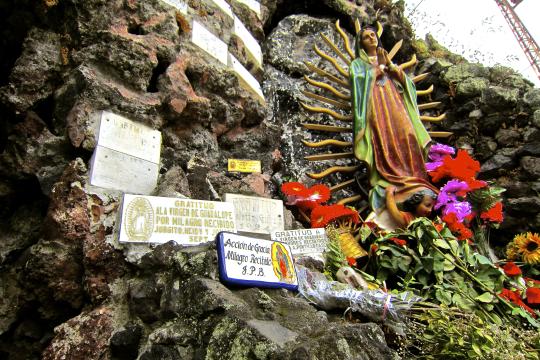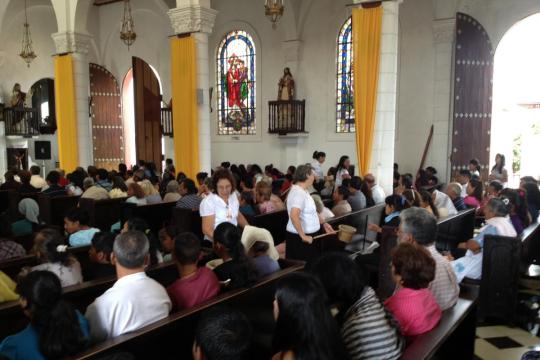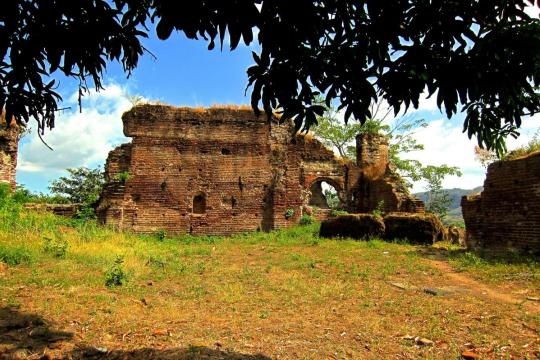El Salvador is the most densely populated in Central America, and faces severe environmental strains. It is the second most deforested country in the Americas, has a severe shortage of potable water and has few natural resources to exploit.
Salvadorans are a warm and welcoming people, but the history of violence that has plagued their country has caused a great level of distrust in one another and in their government. Asked in 1999 about their ability to trust one another, only 14 percent of Salvadorans responded that most people can be trusted. 1 Trust in social institutions is correspondingly low in El Salvador today. The Catholic Church is the most trusted institution: 49.6 percent of Salvadorans say they trust it, followed by 48.4 percent who say they trust Evangelical churches and 44.4 percent who say they trust the army. Almost 27 percent say they trust the media, but trust in businessmen and national government is especially low: At the lowest end of the respect spectrum, only about 16 percent say they trust the National Assembly or political parties.2
El Salvador still lives with the legacy of the armed struggle of the 1980s that killed 79,000 people. To a surprising degree, many of the participants in the conflict on both sides have assumed ordinary roles in society. The two main political parties are descendants of the opposing forces in the war. In 2014, 8.6 per cent of Catholics surveyed ranked themselves the farthest to the left politically on a scale of 1-10, while 8.2 percent placed themselves farthest to the right. 20.9 percent placed themselves in the center, and the median was 5.19.3 The memory of slain churchmen and women like Archbishop Oscar Romero is still very much alive, and Romero’s image is ubiquitous. Still, agreement over that legacy is hardly uniform among Catholics. In a 2014 survey, 65.4 percent of Catholics agreed, and 26 percent disagreed that 35 years after the murder of Romero, now is the time for the Catholic Church to proclaim him a saint. Similarly, 80.6 percent of Catholics agreed, and 16.5 percent disagreed that "The masterminds of the murder of the Jesuit priests and their collaborators should be prosecuted by the Salvadoran justice system."4
Gang violence is the problem that most concerns Salvadorans today, particularly in the capital, San Salvador. The gangs are said to have more than 50,000 members, and on a per capita basis El Salvador has one of the highest murder rates in the world, though that number eased in 2013, when the church helped mediate a truce between the government and imprisoned gang leaders.
The proportion of Salvadorans who self-identify as Catholics has been on the decline, by many measures declining to half or fewer. The biggest source of change has been conversion to Evangelical churches, but the shift has been uneven. Residents in the Western zone of the country, closest to Guatemala, are half as likely (30.8 percent) to identify as Catholic, compared to those in the paracentral zone (63.3 percent). Social Class makes a huge difference in affiliation. Sixty-nine percent of members of the "high" class identify as Catholic (and only 10.3 percent as Evangelical) an the proportions change significantly as one moves down the social class categories. Of people who fit the category of "marginal" workers, 35.8 percent identify as Catholics and 47.2 percent identify as Evangelicals. 5
Safety and security has become a huge industry, and guards with machine guns are visible in front of most banks and many other businesses. Many neighborhoods in San Salvador are dangerous after sundown. Salvadorans comment about the violence of films imported from America, but they also tend to view and import those sorts of American films. In a 2012 national survey, “delinquency and insecurity,” “violence,” and “gangs” outranked “unemployment,” “poverty,” and “the economy” as the most significant problems facing the country.6 One out of five respondents claimed to have been a victim of threats or violence in the previous year. 7 Parish women’s groups have become more vocal about curtailing violence against women.
One measure of Salvadoran cultural values is evident in the 1999 the World Values Survey, which asked Salvadorans to choose five qualities from a list of qualities that are most important to encourage in children. Of the choices, the most frequently chosen quality was “manners” (82.3 percent), while the least frequently chosen was “imagination” (10 percent). The other ranked qualities were “a feeling of responsibility” (66.9 percent), “religious faith” (67 percent), “obedience” (62.4 percent), “tolerance and respect for others” (58.8 percent), “hard work” (38.4 percent), “independence” (35.6 percent), “thrift” (29.8 percent), and “determination and perseverance” (14 percent). Catholics generally valued these qualities at the same rate.
Salvadoran Catholicism can often value remembrance of martyrdom, whether in the form of traditional religious piety, or in the form of the remembrance of martyrs of the 1980s civil war, like Archbishop Oscar Romero.
- 1"World Values Survey: The World's Most Comprehensive Investigation of Political and Sociocultural Change," World Values Survey, accessed August 29, 2013, http://www.worldvaluessurvey.org.
- 2Instituto Universitario de Opinión Pública, “Evaluación del País a Finales de 2014: Consulta De Opinión Pública de Noviembre de 2014” Universidad Centroamericana “José Simeón Cañas,” San Salvador, El Salvador, Febrero de 2015, no 137, pp. 77-91.
- 3Instituto Universitario de Opinión Pública, “Evaluación del País a Finales de 2014: Consulta De Opinión Pública de Noviembre de 2014” Universidad Centroamericana “José Simeón Cañas,” San Salvador, El Salvador, Febrero de 2015, no 137, pp. 96-97.
- 4Instituto Universitario de Opinión Pública, “Evaluación del País a Finales de 2014: Consulta De Opinión Pública de Noviembre de 2014” Universidad Centroamericana “José Simeón Cañas,” San Salvador, El Salvador, Febrero de 2015, no 137, pp. 112-113.
- 5Instituto Universitario de Opinión Pública, “Evaluación del País a Finales de 2014: Consulta De Opinión Pública de Noviembre de 2014,” Universidad Centroamericana “José Simeón Cañas,” San Salvador, El Salvador, Febrero de 2015, no 137, p. 12.
- 6Simeón, Cañas, "Encuesta de Evaluación del año 2012: Consulta de Opinión pública de noviembre de 2012," 16. “Delinquency and insecurity” and “gangs” were cited as the most significant problem by 51 percent of the population; “unemployment,” “poverty,” and “the economy” were cited by 44.6 percent of respondents.
- 7Cañas, "Encuesta de Evaluación del año 2012: Consulta de Opinión pública de noviembre de 2012," 44.



